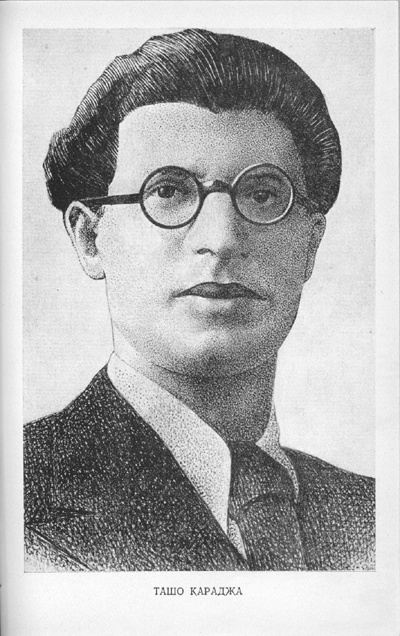Karadzha Tasho
(14.04.1914-23.05.1942)
Tasho Karadzha was one of the most prominent of the communist fighters
in our homeland, who dedicated his whole life to the struggle of the
people and the party.
He was born in 1914 in the village of Dmbeni, Kostur region. His father
- Naso - was a labourer. After completing his primary schooling in Dmbeni,
Tasho went to the city Lerin and joined the Lerin Agricultural College.
As a student in this school in 1929 he joined the ranks of OKNE and
actively fought alongside the youth at the school. He was expelled from
the school for his revolutionary activities. He continued his organizational
work in his own village and in Koreshta. With his youthful energy and
revolutionary passion he spread the communist ideas and established
a youth organization of POKNE.
He was arrested in 1931 at the moment when he was making a speech to
assembled youths and other villagers in the village of Drenoveni. Young,
at the age of 18, he was sentenced in the Kostur court to three months
in prison and three months exile in Larisa. In Larisa he became closely
familiar with the struggle of the proletariat. His great will to gain
knowledge was met by the systematic study of Marxist-Leninism. Tasho
became a man with a broad circle and knowledge.

After his exile he returned to his village and with even greater energy
as a member of CPG he developed broader revolutionary activity in Kostur
- establishment of organizations, spreading of the party's publications,
leading the struggle of the villagers against the despotism of the government,
and the active political work, involvement in the local press etc. That
was how he occupied himself everyday.
In 1934 Lazo Trpovski returned to Dmbeni from the Soviet Union. Tasho
Karadzha's subsequent work was closely tied to that of Lazo's. They
worked together, advised each other and went through Kostur together.
Tasho was arrested in October 1936, tortured at the police station
in Dmbeni, then in Kostur; from there he was sent to exile on the island
Ai-Stratis. From this island in 1938 he was sent to the prisons of Akronafplija.
But nothing could break his will and he withstood all of the sufferings
like a man, in Akronafpolija and in Pilos.
In the summer of 1941 Tasho, together with Trpovski and other leading
activists of CPG, were in the first ranks of the liberation struggle
against the fascist occupiers. He worked in Athens and from September
1941 he was the secretary of the regional committee of CPG in Katerinsko.
His work there was tied to the establishment of the first partisan ranks
of ELAS in the legendary Olympus. In 1941, near the beginning of 1942,
Tasho Kardzha was nominated to carry out leading party work in the city
of Solun. He led the youth and student organizations.
In April 1942 he was arrested by the Gestapo and their collaborator-traitors.
He was savagely tortured for a month and a half with the aim that he
would betray the partisan network and the national liberation struggle,
but Tasho, loyal son of the Party and the people, diligently defended
their interests. In May 1942 in Solun, before the German fascist military
tribunal he told off the Nazi executioners and predicted their end,
and with dignity he protected CPG and its work and the honourable war
of the Soviet Union. The military tribunal sentenced him to death. Armed
youths made three separate attempts to save the beloved Tasho but they
did not succeed.
Sentenced to death and finding himself in Gedi-Kule, Tasho managed
to send a telegram to his mother in Dmbeni. When his mother reached
Solun and after many hardships she was allocated five minutes visit
with her son in Gedi-Kule. Tasho managed only to tell her "The communists
will bring freedom and happiness." That was on 19 May. After three days,
the morning of 23 May 1942, Tasho Karadzha was shot at "Pavlos Melas"
in Solun, refusing to wear a blindfold. He proudly shouted, "Long live
the Communist Party!"
The name Tasho Karadzha is widely known among the Macedonian people
in the homeland. The people made up songs about the time of the national
liberation struggle. His life and his work, his call to the struggle
became an example for all the young Macedonan and Greek fighters, in
the name of the free and happy future of our Homeland.
V. Karadzha
From: For Sacred National Freedom: Portraits Of Fallen Freedom
Fighters
© 2009
Return to Index
For Sacred National Freedom: Portaits Of Fallen Freedom Fighters
